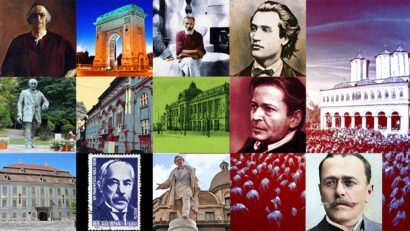A Look at the Radio of Yore
In its 86 yearsexistence, the Romanian public radio broadcaster has had among its editors some foremost journalists and intellectuals of pre-war and interwar Romania.

România Internațional, 07.11.2014, 14:33
In its 86 years’existence, the Romanian public radio broadcaster has had among its editors some foremost journalists and intellectuals of pre-war and interwar Romania. One of them is Liliana Ursu, a poet, translator, Fulbright scholar, associate professor with Pennsylvania State University and University of Louisville in Kentucky in 2000, and poet in residence at Stadler Center for Poetry in 2003. For over 30 years she produced cultural programmes for the public radio, after a five-year period working in television.
Here is Liliana Ursu: “I started working for the public radio after a job in television, and I found it very easy to work here, after that. I found radio to be less burdening, I felt it was a chance to be more ‘myself’ and to work better. It was just me and the microphone and my tape recorder. Actually, I started working on magnetic tape. And when I was in the studio, there was also the sound engineer. But it was amazing, I felt I was walking on air. The environment was a lot more exciting, people were less shallow than those working in TV. The only thing I was not happy with was the huge magnetic tape recorder, weighing 8 to 10 kilos, which I had to carry with me. It wasn’t easy. But the technology advanced, we moved to cassette recorders and today things are even easier. You carry your digital recorder in your purse and it no longer feels like a burden.”
At Radio Romania, after a brief period working with the drama department, where they used to stage Shakespeare plays, among others, Liliana Ursu moved to the literature department. The work there was more in line with her poetic concerns, but on the other hand she had to deal with political censorship.
Liliana Ursu: “For a ten-minute broadcast, the censor in charge would keep me late at the office to go through all the materials. They would make sure none of the shows included words like ‘cross’, ‘God’, or any criticism regarding the situation in the country. To give you an example, I produced a TV documentary on the monasteries in Moldavia, although I wasn’t allowed to call them monasteries. So its title was ‘Monuments built by ruler Stephen the Great’. At some point, at the Radio, we were given a list of banned words, phrases we were not allowed to say on air. One of them was ‘loneliness’. It was hard. I would often cry or come home very sad, because after working really hard on a show, half of it was often edited out. I suffered as if the show were one of my own poems. In a way, my radio work was my poem in prose.”
After the anti-communist Revolution of 1989, the editors in chief who were in charge of that kind of censorship were removed, and a golden period started, when the voices and cultural themes that had been banned started being promoted. Liliana Ursu produced shows like “The Radio Literary Review,” “The Coordinates of Poetry” and “Writers at the Microphone.” For all of them, she had the support of other radio professionals and of listeners alike.
Here is Liliana Ursu again, talking about another characteristic of radio work: “It was close cooperation. You cannot do anything unless you work as part of a team. A show can only be good if both the editor and the sound engineer do their job. I’ve always had loyal listeners. They would call or write to the office, asking for certain programmes to be rerun, or congratulating us, and so on. We had their feedback. Sometimes the listeners themselves would recommend people whom we should interview. People used to listen to the radio a lot.”
Although she retired from the Radio Broadcasting Corporation, poet Liliana Ursu has fond memories of her work here: “I love the radio, it makes no difference whether I am in Romania or abroad. It is always with me, and I am a faithful listener. This is the gift that God has given me: to be able to communicate both through the written word, and through words uttered at the microphone.”




























